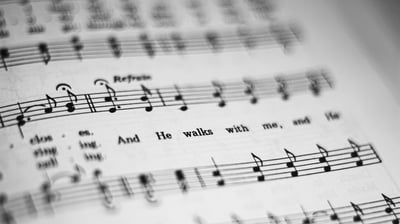From Performance to Purpose: The Importance of Authentic Worship
Entertaining worship sets don't just miss the point. True corporate worship leads believers into unity before God. The focus should be on worship, not performance. Discover the eternal value of worship and the importance of unity in song before the throne of God.
L.K.
5 min read


Mega Church
My sister leaned over during the second chorus and said, “Her arm is turning red! It’s all splotchy! I bet it hurts!”
I looked more closely at the worship leader. Her left hand gripped the microphone she was belting into like Carrie Underwood. The sleeves of her blouse were rolled up just past the elbows, and with her right hand, she smacked her left forearm to the beat of the song, keeping time as a smattering of congregants clapped along. She was hitting her arm so hard it looked painful. It was hard to see clearly through the haze and flashing lights. But when the strobe hit it just right, I could see that the tender flesh was inflamed and angry. There is no way it didn’t hurt.
The worship team was immense. At least 20 people were on stage, hazy through the cloud of artificial smoke. If the congregants were singing along, I couldn’t hear any of them. I could only hear the singers on stage and see a few people in the neat rows of chairs clapping along. It was like a strange concert that a few people had bought tickets to, but no one seemed to care about it.
After the worship set, a few musicians stayed on stage, softly playing a keyboard and a guitar. The curtains behind the stage opened slowly to reveal the baptistry. A staff pastor was already in the water, ready to introduce the first baptism. The lights were turned up, setting a crisp white spotlight on him. As the lights and haze hit him, he waved his hand in front of his face.
“Wow. It's smoky up here,” he said, squinting at the congregation, trying to see us through the lingering haze.
Laughter rolled through the congregation. That, I could hear. Surely, he was not meant to point out and laugh at the ambiance that had been carefully curated to make us feel something.
This church was neither the first nor last experience I had with a smokey worship set. Similar performances at conferences and retreats have always left me with questions: Why is there haze? What am I supposed to think about it? Am I supposed to ignore it and not be distracted by it? Am I supposed to believe it is the Holy Spirit himself, hovering over our service, delighting in our song? Am I supposed to feel like I’m in a holy nightclub, a heavenly honkey-tonk, a trendy dance club at 10 am on a Sunday?
This type of church worship set has one goal: to entertain. The leaders ignore whether the congregants know the song and can sing along. The singers vocalize meaninglessly throughout, not meant to be sung along with.
My 17-year-old daughter looked at me during an extended guitar solo during one service and asked, “What are we supposed to be doing right now?”
It was such a great question. This worship song should have aimed to draw the church into worship, bowing our hearts and minds before a great, mighty, loving, and gracious God to praise his goodness and confess our undeservingness of his salvation. So, why did we stop singing the words and listen to this guy wail on his axe for what felt like 17 minutes? It was too distracting to tune out. Everyone just watched him. Some people applauded his performance when we resumed singing. The goal was not worship. The goal was performance and entertainment.
Downtown Church
In contrast, Downtown Church had a worship team of eight people who took turns serving. They didn’t have any lights or haze. There was usually a keyboardist and guitarist, occasionally a cajon, and one or two singers. Worship was simple. We sang three to five songs each week. These songs repeated often, pulling from a total worship song sampling of fewer than 30 pieces. So, as our first several months passed at this church, we became familiar with the songs. I knew each one as the title appeared on the screen before the music began. I hummed them throughout the week. I sang them repeatedly while driving or washing dishes. Their words were buried in the recesses of my mind.
Occasionally, the worship team would add a new song to the repertoire. The worship leader would say, “This is a new song. If you’re unfamiliar with it, listen to the words and let them sink in as we begin. Join us in worshiping as soon as you can.”
We would sing that new song for a few weeks until its words and melody were familiar. Then, it would be added to the rotation. The goal at this church was for corporate worship to be just that - the church body singing praises, confessions, and truth to the God of the universe and Jesus, His Son, unified by the power of the Holy Spirit. The point was to lead every congregant in the room into a place of worship. The songs were doctrinally sound. While there are plenty of songs sung in churches every week that are beautiful and moving, this church was careful to sing only true words.
Eternal Worship
Worshipping God is one of the few things we do now that will last forever. We toil and strive, learn and teach, struggle and overcome. One day, all of that will be over, but we will still worship.
Revelation 7:9-10 tells us that in eternity, we will join with every nation, all tribes and peoples and languages. Together, we will stand before the throne of God and before the Lamb. We will cry out in worship. We will declare that salvation belongs to our God, who sits on the throne, and to the Lamb.
When this life is over, when Jesus returns, and we are renewed, we will worship. And in the meantime, as we wait—in our waiting and hopeful state this Sunday—we will worship. In true corporate worship, we see the beautiful shadow of things to come. We gather with people around us, different from us, in various places in their faith, from differing backgrounds, and come together united by the Holy Spirit before the throne of God.
A church service that neglects to draw its people into true, authentic, scriptural, corporate worship and instead puts on a performance for the entertainment of those in the room does not act as the Church. While watching a woman slap her arm until it is red and swollen is mildly entertaining, true worship is of exceeding value to the Christian. At Downtown Church, I learned from Worship. I learned doctrine from the songs we sang to our Father. I learned what it was to unite with brothers and sisters at the feet of Jesus.
© 2025. All rights reserved.





